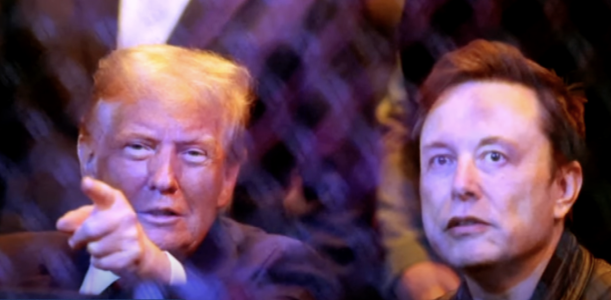The White House reveals Elon Musk's surprising real authority over DOGE–Here's what you need to know.
- Replies 8
In the intricate dance of politics and power, the spotlight often falls on the most charismatic and influential figures.
Elon Musk, the billionaire entrepreneur known for his ventures with Tesla and SpaceX, is no stranger to such attention.
However, recent revelations from the White House have cast a new light on Musk's involvement with the Trump administration, particularly with the Department of Government Efficiency (DOGE), a task force aimed at slashing federal spending.
Musk's presence in the political arena has been both prominent and controversial.
As a force of innovation and business acumen, his association with the Trump administration's cost-cutting initiatives seemed to suggest a significant role.
Yet, a recent court filing from the White House paints a different picture, one where Musk's authority within DOGE is far from what many had assumed. According to the filing, Elon Musk is not an employee of DOGE and “has no actual or formal authority to make government decisions himself.”
This statement raises eyebrows and questions about the true extent of Musk's influence in the Trump administration and within DOGE, which operates across various federal agencies such as the IRS and the Treasury Department to identify and eliminate waste and fraud.

The White House has yet to respond to the request for comment regarding Musk’s role at DOGE.
The filing came in response to a request from the US District Judge Tanya Chutkan, who is presiding over a case challenging the constitutionality of Musk's actions since President Trump took office.
The lawsuit, brought forth by fourteen states, alleges that Musk has been exercising powers reserved for nominated and confirmed government officials, thus overstepping his bounds.
“There is no greater threat to democracy than the accumulation of state power in the hands of a single, unelected individual,” the lawsuit alleges. “In recent weeks, defendant Elon Musk … has roamed through the federal government unraveling agencies, accessing sensitive data and causing mass chaos and confusion for state and local governments, federal employees and the American people.”
During the February 17 hearing, Harry Graver, Justice Department attorney said that, "There is not a single instance of Musk or USDS commanding these actions," referring to widespread firings of government employees across various agencies last week. Instead, the government workers were fired by officials within their own agencies.”
Appointed by President Trump to provide “advice and guidance from outside of Government,” Musk has been a visible figure in the administration's efforts to reform and reduce federal spending.
Alongside fellow billionaire Vivek Ramaswamy, Musk was tasked with partnering with the White House and the Office of Management & Budget to drive large-scale structural reform. However, Ramaswamy left DOGE in January and is currently planning to run for Ohio governor.
Source: ABC News / Youtube.
Musk's proximity to power was evident when he stood behind President Trump in the Oval Office, discussing DOGE's mission to take “very simple and basic” steps to cut federal spending.
When asked if there was anything Musk cannot interfere with, Trump answered, "Well, we haven't discussed that much. I'll tell him to go here, go there, he does it. He's got a very capable group of people."
His daily communications with the president and his “partnership” with agency heads suggest a level of involvement that goes beyond mere advisory capacity. However, the White House's filing emphasizes that Musk's role is akin to that of a senior adviser, similar to Anita Dunn's position under the Biden administration.
"Like other senior White House advisers, Mr. Musk has no actual or formal authority to make government decisions himself," the filing said. "Mr. Musk can only advise the president and communicate the president's directives."
As a special government employee (SGE), Musk is expected to serve the Trump administration for no more than 130 days within a one-year period, a role designed to leverage outside expertise without granting formal decision-making power.
Source: CBS News / Youtube.
Musk's actions with DOGE have not been without controversy. Multiple lawsuits and alarm bells from Democratic lawmakers and consumer advocates have been raised over DOGE's reported access to personal data and the mass firings of federal employees.
These actions have sparked fears from unions, federal workers, and officials. They have argued that Musk has unchecked authority and potential conflicts of interest, given his business interests in companies that receive federal contracts.
Despite these concerns, Judge Chutkan recently ruled against a temporary restraining order to halt Musk and DOGE's activities, finding that the states failed to demonstrate imminent, irreparable harm.
Also read: Elon Musk takes aim at government spending: What it means for Medicare and Medicaid benefits
Nonetheless, the judge expressed that the alleged actions by Musk and DOGE are “concerning” and “troubling,” highlighting the unusual nature of mass federal worker firings and Musk's lack of Senate confirmation.
The White House official, speaking on condition of anonymity, confirmed that Musk is not compensated for his work, which aligns with the SGE designation created to allow the government to draw on external expertise without incurring financial obligations–thus, his financial disclosure report remains private.
Source: CBS News / Youtube.
In defense of his role, Musk has emphasized the transparency of DOGE's work, asserting that any potential conflicts of interest would be evident to the public. He said, "So you can see everything that's going on, and then you can see, am I doing something that benefits one of my companies or not? It's totally obvious."
Recommended for you: Could DOGE play a role in your wallet? What this means for Americans’ savings

What are your thoughts on influential figures from the private sector being involved in the government? Join the conversation in the comments below!
Elon Musk, the billionaire entrepreneur known for his ventures with Tesla and SpaceX, is no stranger to such attention.
However, recent revelations from the White House have cast a new light on Musk's involvement with the Trump administration, particularly with the Department of Government Efficiency (DOGE), a task force aimed at slashing federal spending.
Musk's presence in the political arena has been both prominent and controversial.
As a force of innovation and business acumen, his association with the Trump administration's cost-cutting initiatives seemed to suggest a significant role.
Yet, a recent court filing from the White House paints a different picture, one where Musk's authority within DOGE is far from what many had assumed. According to the filing, Elon Musk is not an employee of DOGE and “has no actual or formal authority to make government decisions himself.”
This statement raises eyebrows and questions about the true extent of Musk's influence in the Trump administration and within DOGE, which operates across various federal agencies such as the IRS and the Treasury Department to identify and eliminate waste and fraud.

The White House's court filing clarifies that Elon Musk does not hold any actual or formal authority to make governmental decisions, framing his role as advisory. Image source: ABC30 Action News.
The White House has yet to respond to the request for comment regarding Musk’s role at DOGE.
The filing came in response to a request from the US District Judge Tanya Chutkan, who is presiding over a case challenging the constitutionality of Musk's actions since President Trump took office.
The lawsuit, brought forth by fourteen states, alleges that Musk has been exercising powers reserved for nominated and confirmed government officials, thus overstepping his bounds.
“There is no greater threat to democracy than the accumulation of state power in the hands of a single, unelected individual,” the lawsuit alleges. “In recent weeks, defendant Elon Musk … has roamed through the federal government unraveling agencies, accessing sensitive data and causing mass chaos and confusion for state and local governments, federal employees and the American people.”
During the February 17 hearing, Harry Graver, Justice Department attorney said that, "There is not a single instance of Musk or USDS commanding these actions," referring to widespread firings of government employees across various agencies last week. Instead, the government workers were fired by officials within their own agencies.”
Appointed by President Trump to provide “advice and guidance from outside of Government,” Musk has been a visible figure in the administration's efforts to reform and reduce federal spending.
Alongside fellow billionaire Vivek Ramaswamy, Musk was tasked with partnering with the White House and the Office of Management & Budget to drive large-scale structural reform. However, Ramaswamy left DOGE in January and is currently planning to run for Ohio governor.
Source: ABC News / Youtube.
Musk's proximity to power was evident when he stood behind President Trump in the Oval Office, discussing DOGE's mission to take “very simple and basic” steps to cut federal spending.
When asked if there was anything Musk cannot interfere with, Trump answered, "Well, we haven't discussed that much. I'll tell him to go here, go there, he does it. He's got a very capable group of people."
His daily communications with the president and his “partnership” with agency heads suggest a level of involvement that goes beyond mere advisory capacity. However, the White House's filing emphasizes that Musk's role is akin to that of a senior adviser, similar to Anita Dunn's position under the Biden administration.
"Like other senior White House advisers, Mr. Musk has no actual or formal authority to make government decisions himself," the filing said. "Mr. Musk can only advise the president and communicate the president's directives."
As a special government employee (SGE), Musk is expected to serve the Trump administration for no more than 130 days within a one-year period, a role designed to leverage outside expertise without granting formal decision-making power.
Source: CBS News / Youtube.
Musk's actions with DOGE have not been without controversy. Multiple lawsuits and alarm bells from Democratic lawmakers and consumer advocates have been raised over DOGE's reported access to personal data and the mass firings of federal employees.
These actions have sparked fears from unions, federal workers, and officials. They have argued that Musk has unchecked authority and potential conflicts of interest, given his business interests in companies that receive federal contracts.
Despite these concerns, Judge Chutkan recently ruled against a temporary restraining order to halt Musk and DOGE's activities, finding that the states failed to demonstrate imminent, irreparable harm.
Also read: Elon Musk takes aim at government spending: What it means for Medicare and Medicaid benefits
Nonetheless, the judge expressed that the alleged actions by Musk and DOGE are “concerning” and “troubling,” highlighting the unusual nature of mass federal worker firings and Musk's lack of Senate confirmation.
The White House official, speaking on condition of anonymity, confirmed that Musk is not compensated for his work, which aligns with the SGE designation created to allow the government to draw on external expertise without incurring financial obligations–thus, his financial disclosure report remains private.
Source: CBS News / Youtube.
In defense of his role, Musk has emphasized the transparency of DOGE's work, asserting that any potential conflicts of interest would be evident to the public. He said, "So you can see everything that's going on, and then you can see, am I doing something that benefits one of my companies or not? It's totally obvious."
Recommended for you: Could DOGE play a role in your wallet? What this means for Americans’ savings
Key Takeaways
- The White House's court filing clarifies that Elon Musk does not hold any actual or formal authority to make governmental decisions, framing his role as advisory.
- Concerns have been raised about Musk's influence in the Trump administration and his involvement with DOGE, a cost-cutting task force.
- Multiple lawsuits have been filed against Musk, DOGE, and President Trump, with allegations suggesting Musk is exercising power beyond his role.
- Despite the lawsuits and concerns, the White House contends that Musk is a senior adviser comparable to other such roles in past administrations, without the ability to directly implement government decisions.
What are your thoughts on influential figures from the private sector being involved in the government? Join the conversation in the comments below!






